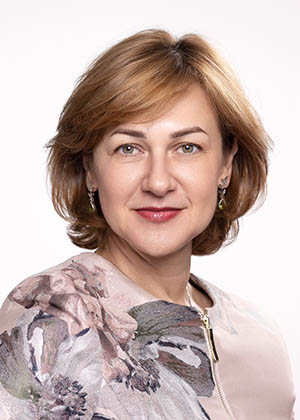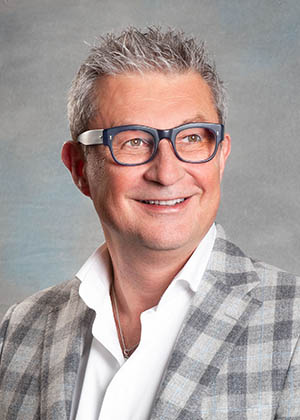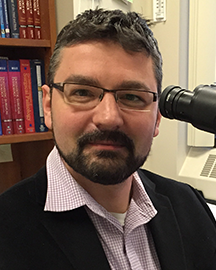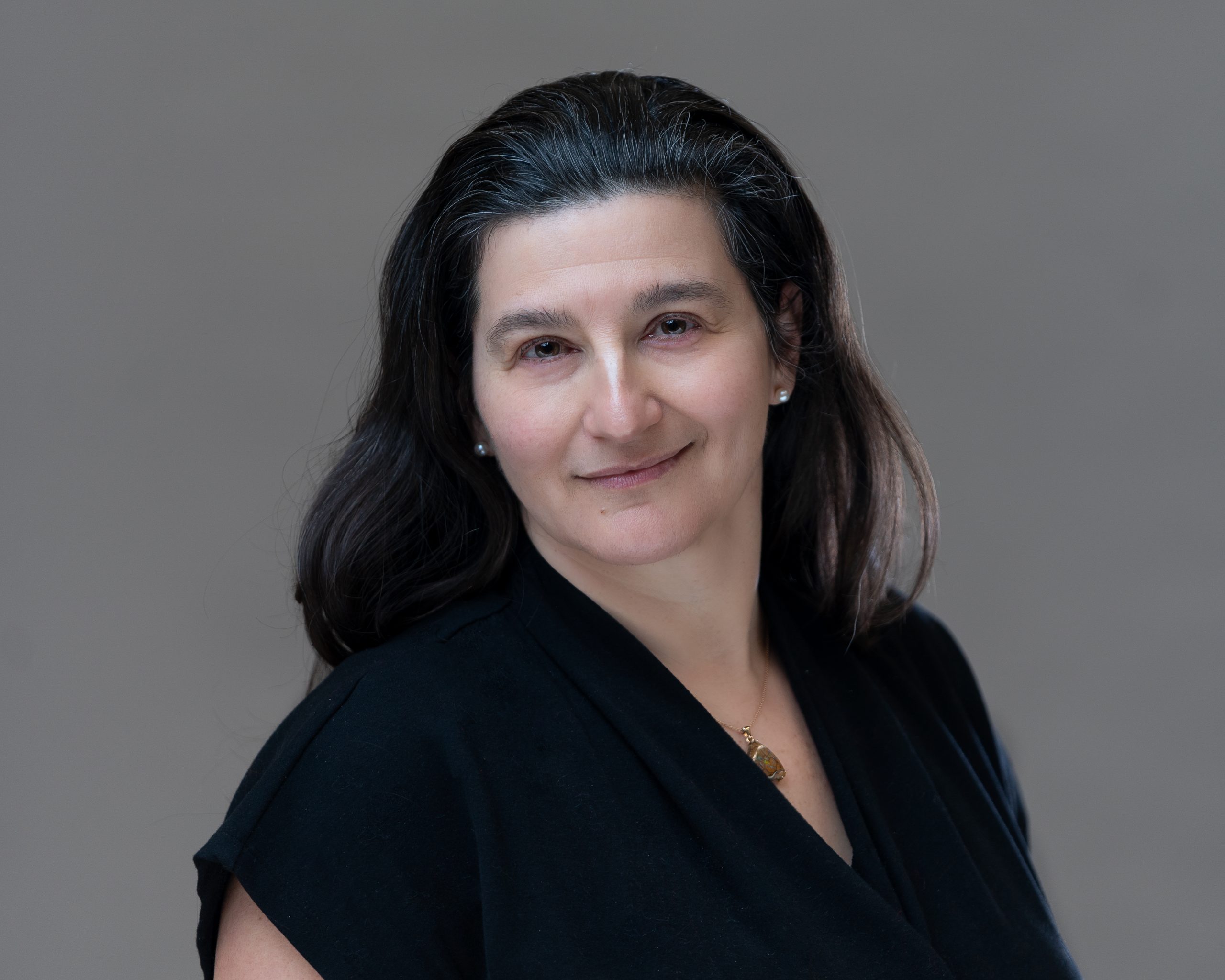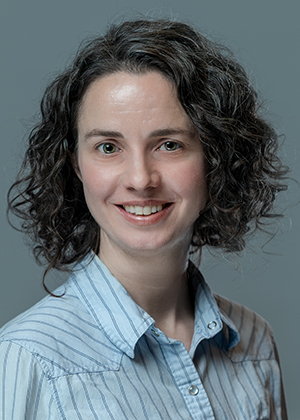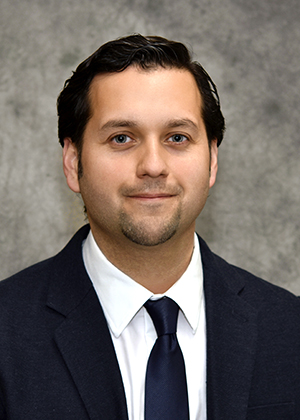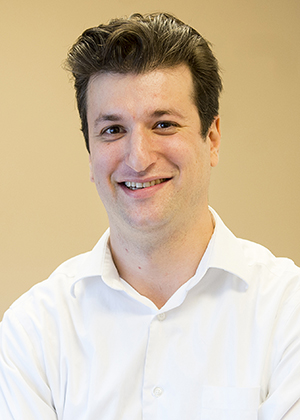Dr. Ionescu is a graduate of University of Medicine and Pharmacy “Iuliu Hatieganu” in Cluj Napoca, Romania. She completed her postgraduate training in Anatomical and Clinical Pathology at the University of Pittsburgh Medical Center and a Fellowship in Gynecological Pathology at Vancouver General Hospital. She has practiced as a Consultant Pathologist at BC Cancer Agency in Vancouver since 2006. She is currently a Clinical Professor of Pathology at UBC and served as the residency program director for the Anatomic Pathology Residency Program between 2009 – 2017.
Her specific areas of diagnostic expertise are lung, gynecologic and breast pathology. She is an author of over 60 scientific publications and book chapters. She is the author and invited speaker at numerous regional, national and international lectures. Her investigation interests include oncologic pathology and molecular biomarkers, lung cancer and adult health education. She is the Canadian Anatomic and Molecular Pathology (CAMP) and CAMP pathology Oncology Digital Series (CAMP-PODS) course director.
Dr. Ionescu is an enthusiastic advocate of pathologists participating in numerous patient education forums, TV shows, advocacy and fundraising campaigns, being Medical Advisor for Lung Cancer Canada, moderator, presenter and community excellence awardee at ROMPOST TV on Omni TV, and in 2015 supporting biomarker testing before the House of Commons Committee on Health.
2024 FACULTY
My main research interest is to understand the involvement of the microbiome in health promotion and disease development. As a pathologist I am specialized in gastrointestinal-, pulmonary- and infectious disease pathology, as well as tumor genetics with a focus on molecular diagnostic methods. I established diagnostic microbiome analysis and untargeted deep sequencing applications for infectious diseases at the Medical University of Graz, which is a unique diagnostic measure used from clinicians in Austria and abroad. Complementing visualization of diseases with microscopy techniques and spatial transcriptomics allows me to gain deep insights into pathogenetic mechanisms. My research group studies the gut microbiome in the context of inflammatory GI diseases, specifically addressing its immunomodulatory potential and how this contributes to diseases like inflammatory bowel disease (IBD) and cancer. A major research focus is the modulation of the GI microbiome via fecal microbiota transplantation (FMT). Together with my clinical partners I established the workflows and frameworks for FMT in Graz, wherein our group is international renown. Currently, we try CV Gregor Gorkiewicz 2 to define the “active ingredients” of FMT to develop new “biotherapies” to replace FMT. I serve also as a PI in the doctoral school “Molecular Inflammation” (DK-MOLIN) and as an academic editor for the journal MICROBIOME. During the pandemic I started investigating COVID-19. Due to a unique BSL-3 autopsy facility at my institution, we were able to establish a huge sample and virus collection. Autopsy complemented with microbiology and “omics” techniques (RNAseq, metabolomics, etc.) allowed us to gain deep insights into SARS-CoV-2 infection. Besides in publications these findings were also covered extensively in public printed media and on TV.
Aleodor (Doru) Andea, MD, MBA, is Chief of Dermatopathology and Professor of Pathology and Dermatology at Roswell Park Cancer Institute, University of Buffalo and Adjunct Professor of Pathology and Dermatology at the University of Michigan in Ann Arbor, MI. Dr. Andea’s areas of expertise are Dermatopathology and Molecular Pathology. He received his MD from “Victor Babes” University of Medicine, Timisoara, Romania and completed an Anatomic and Clinical Pathology Residency at Wayne State University in Detroit, Michigan. This was followed by fellowships in Dermatopathology at Medical University of South Carolina, Charleston, SC and Oncologic Pathology and Molecular Pathology at Memorial Sloan-Kettering Cancer Center, New York, NY.
Dr. Andea also earned a Master of Business Administration degree from UAB School of Business. At Roswell Cancer Center Dr. Andea has established and is leading the Dermatopathology Molecular Diagnostics Laboratory providing clinical testing for melanocytic tumors. Dr Andea has a particular interest in developing and improving ancillary molecular tests to help classify and predict prognosis in histologically ambiguous melanocytic tumors. He was invited to deliver numerous national and international presentations on a variety of dermatopathology topics, with a focus on molecular diagnostic tools for melanocytic tumors. Dr. Andea is the author of over 100 peer-reviewed publications, one book, 3 book chapters and over 100 abstracts mainly in the field of dermatopathology.
2023 FACULTY
Enrique de Álava, M.D., Ph.D., Chairman of the Department of Pathology at Virgen del Rocío University Hospital and Principal Investigator at the Institute of Biomedicine of Seville since 2013, also holds a professorship in Pathology at the University of Sevilla. He orchestrates the Precision Medicine Strategy of the Andalusian Health Service, integrating cutting-edge molecular diagnostics into clinical practice.
Prof. de Álava, a pathologist with a deep interest in bone, soft tissue, and molecular pathology, served as the president of the Spanish Society of Pathology from 2015 to 2017. He completed his medical training and obtained his Ph.D. from the University of Navarra. His postdoctoral studies at Memorial Sloan Kettering Cancer Center were underpinned by a Spanish Ministry of Education and Science fellowship.
His career at the Spanish Research Council (CSIC) transitioned from a research scientist to a Full Research Professor, during which he also led the Molecular Pathology Laboratory at the Cancer Research Center of Salamanca. His research pursuits in sarcoma pathogenesis and diagnostic innovations have been recognized and supported by European and national funding bodies, as well as industry collaborations.
Leading a consortium with a substantial project on sarcoma funded by AECC for 2023-2027, Dr. de Álava is also a vocal participant in the medical and scientific dialogue online. He utilizes Twitter to share professional updates, engage with peers, and contribute to the global conversation on pathology. He tweets personally @EnriquedeAlava and professionally shares insights and developments from his department @PathologyHUVR and his laboratory @LabHUVR, bridging the gap between complex molecular research and everyday clinical practice.
Dr. Dara Aisner is a board-certified certified Anatomic and Molecular Genetic Pathologist. She is a Professor of Pathology at the University of Colorado School of Medicine in Denver, Colorado and a member of the University of Colorado Comprehensive Cancer Center. She is also board certified in Clinical Informatics.
She is the Director of the Colorado Molecular Correlates Laboratory and the Vice Chair for Genomic Laboratory Medicine within the Department of Pathology. The laboratory provides CLIA level clinical services in the evaluation of patient tumor specimens for personalized medicine approaches.
She is a member of numerous oncology pathology and guidelines committees including the NCCN Non-Small Cell Lung Cancer panel, among others. Dr. Aisner is a leader in helping establish formal processes helping medical oncologists and pathologists work optimally together, which is especially important in today’s world of precision diagnostics, personalized medicine and next-generation sequencing testing.
Lucian R. Chirieac, MD is Professor of Pathology at Harvard Medical School and Senior Pathologist at the Brigham and Women’s Hospital in Boston, Massachusetts.
He is a contributing author of the 4th and 5th Editions of W.H.O. Classification of Tumours of the Lung, Pleura, Thymus and Heart. He has authored and coauthored more than 140 articles published in peer-reviewed journals and numerous book chapters in textbooks with a focus on lung cancer and malignant mesothelioma. Dr. Chirieac is the editor of two books, Precision Molecular Pathology of Lung Cancer, and Molecular Pathology of Lung Cancer.
He is coinvestigator of 3 National Institutes of Health grants and is a member in 7 prestigious national and international professional societies. Dr. Chirieac is the only pathologist elected as permanent member in the National Clinical Trials Network (NCTN) Therapeutic Disease Specific Steering Committee and NCI Community Oncology Research Program (NCORP) Cancer Control Steering Committee at the National Cancer Institute (NCI). As a pulmonary oncologic pathologist, he is a member of the Non-Small Cell Lung Cancer Committee and Malignant Mesothelioma Committee of the National Comprehensive Cancer Network (NCCN), which establishes international guidelines for the treatment of lung cancer and malignant mesothelioma.
In 2018 and 2019 Dr. Chirieac was recognized for two consecutive years as one of the most influential researchers in science. He received the Highly Cited Researcher Award by Web of Science Group for “exceptional influence and research performance demonstrated by production of multiple highly cited papers that rank in the top 1% by citations for field and year in Web of Science“.
Dr. Chirieac is an invited member to the International Mesothelioma Panel and the U.S.-Canadian Mesothelioma Reference Panel. He is on the Pathology Committee for the Alliance for Clinical Trials in Oncology, which is supported by the National Cancer Institute, is a permanent member on the Non-Small Cell Lung Cancer Panel of the National Comprehensive Cancer Network and is a committee expert on the International Committee on Cancer Reporting. He is a member of multiple professional societies including, the United States and Canadian Academy of Pathology, Pulmonary Pathology Society, American Association for Cancer Research, International Association for the Study of Lung Cancer, and American Society of Clinical Oncology. He is a fellow of the American Society of Clinical Pathologists and the College of American Pathologists. Dr. Chirieac has received many honors and awards and participates in high-profile national and international scientific meetings. Dr. Chirieac was invited to moderate, chair, and present at highly reputable meetings like the United States and Canadian Academy of Pathology (USCAP), International Association for the Study of Lung Cancer (IASLC), Pulmonary Pathology Society (PPS), World Conference on Lung Cancer, Romanian Academy of Sciences and International Academy of Pathology (IAP). He routinely lectures on aspects of malignant mesothelioma and lung cancer at conferences, seminars and meetings throughout United States, Europe, Australia, Asia and Middle East.
Dr. Goswami obtained her undergraduate degrees in Genetics and Medical Microbiology from the University of Manitoba and her undergraduate medical degree from the University of Toronto. She subsequently completed her residency in Anatomical Pathology at McGill University, and completed a PhD from the University of Toronto examining the use of microRNAs in the prognostication of mantle cell lymphoma. She went on to obtain clinical subspecialty training in Hematopathology and Molecular Genetic Pathology at the University of British Columbia and the MD Anderson Cancer Center, holding U.S. board certification in both subspecialties. Dr. Goswami is an Assistant Professor in the Department of Laboratory Medicine and Pathobiology within the Faculty of Medicine at the University of Toronto. Her primary research interest involves the application of molecular techniques to assist in the diagnosis and prognosis of hematologic and solid tumour malignancies. She is also interested in molecular pathology education and served as the elected Hematopathology representative on the AMP Training & Education from 2017-2019. She currently works as a staff hematopathologist and is the Hematopathology Molecular Lead at Sunnybrook Health Sciences Centre in Toronto, Ontario, Canada.
Dr. Hyrcza is a molecular biologist and an anatomical pathologist. He completed the MD/PhD program at the University of Toronto with the PhD thesis focusing on the transcriptional regulation of the type I interferon responses in HIV infection. He then completed anatomical pathology training at the University of British Columbia and a fellowship in Head & Neck and Endocrine Pathology at UofT. He is currently the consultant pathologist in Head and Neck, Ophthalmic & Endocrine Pathology at the Foothills Medical Center and Rockyview General Hospital. Dr Hyrcza is married and has three children.
Marius Ilié is Professor of Pathology at the Nice Medical School, Côte d’Azur University and Surgical Pathologist at the Clinical and Experimental Pathology Laboratory, Nice University Hospital. He has special interest in thoracic pathology, melanoma and thyroid cancer, molecular pathology. He has responsibility for the day-to-day running of the Liquid biopsy Unit, as well as management of several projects with industry partners within the Biobank. He has a longstanding interest and expertise in the area of prognostic and predictive biomarkers in thoracic oncology as well as in Biobanking. He has contributed to several publications in the field of biomedical research and biorepository science. He is also dedicated to teaching as Deputy Director of the MSc “Biobanks and Complex Data Management” and Director of the Research Master “Oncology and Translational Research” at the Côte d’Azur University.
Dr. Laskin is a Clinical Associate Professor in the Department of Medicine at the University of British Columbia, Associate Member in Canada’s Michael Smith Genome Sciences Centre, and an active member of the medical oncology staff at BC Cancer, Vancouver. Dr Laskin’s clinical and research interests have primarily focused around lung and head and neck cancers. In recent years her research has evolved towards genomic and personalized medicine and she is the clinical program leader for the Personalized Oncogenomics (POG) Program which is a collaborative research program that involves the clinicians of BC Cancer and the Genome Sciences Centre. The POG program is truly a translational research effort that uses in-depth genomic sequencing to guide chemotherapy decision-making in a clinically relevant time-frame.
Professor Umberto Malapelle in an Associate Professor in School of Medicine at the University of Naples Federico II. Umberto is currently the Chair of Predictive Molecular Pathology Laboratory, Department of Public Health of University Federico II of Naples.
His main research interest is in the field of genomic biomarkers validation and testing for predictive information in the field of lung cancer, metastatic colorectal cancer, melanoma and gastrointestinal stromal tumor.
Moreover, he has developed skills in tailoring Next Generation Assays for several different applications with a special focus on the simultaneously detection of clinically relevant alterations (i.e., EGFR mutations, ALK traslocation, PD–L1 expression) in the routine setting including handling of different sample types, such as tissues and/or liquid biopsy specimens.
Frédérique PENAULT-LLORCA, MD, PhD, graduated as a medical specialist in pathology in 1993 and in oncology in 1995. Also, in 1995, she received a PhD from the Université d’Aix-Marseille II in cellular biology and microbiology, on the topic of HER2. Frédérique PENAULT-LLORCA is currently professor of Pathology at the University of Clermont-Ferrand, CEO of the Comprehensive Regional Cancer Institute Centre Jean PERRIN, Clermont-Ferrand, France, deputy director of the research team INSERM 1240 IMoST, and head of the Molecular Biology Plateform at Centre Jean Perrin. She serves as vice-president of the UNICANCER group and chairs of the Immuno-Oncology group at UNICANCER R&D. She is a member of several pathology and oncology societies, with her main areas of expertise being female cancers. She co-chairs the French breast cancer guidelines of Nice-St Paul. Frédérique PENAULT-LLORCA has conducted various biomarkers-based research studies in breast, GYN, lung, digestive tract, prostate and thyroid cancer in relation to response to targeted therapies and immunotherapies. Frédérique PENAULT-LLORCA has participated to more than 480 peer-reviewed publications and several books on female cancers and pathologic testing methods and issues.
2022 FACULTY
Malcolm Hayes is a pathologist at the BC Cancer Agency (BCCA) in Vancouver. Dr. Hayes has worked at the BCCA since 1993 and has broad expertise in surgical pathology and cytopathology and major interests in breast, skin, gynecological and soft tissue pathology. He is a Clinical Professor of pathology at the University of British Columbia and a Fellow of the Royal College of Pathologist of UK. He has many years of expertise in oncological pathology based on 30 years experience of a large volume of challenging consultation cases referred to the BCCA .
Marius Ilié is Professor of Pathology at the Nice Medical School, Côte d’Azur University and Surgical Pathologist at the Clinical and Experimental Pathology Laboratory, Nice University Hospital. He has special interest in thoracic pathology, melanoma and thyroid cancer, molecular pathology. He has responsibility for the day-to-day running of the Liquid biopsy Unit, as well as management of several projects with industry partners within the Biobank. He has a longstanding interest and expertise in the area of prognostic and predictive biomarkers in thoracic oncology as well as in Biobanking. He has contributed to several publications in the field of biomedical research and biorepository science. He is also dedicated to teaching as Deputy Director of the MSc “Biobanks and Complex Data Management” and Director of the Research Master “Oncology and Translational Research” at the Côte d’Azur University.
Dr. Natasha Leighl leads the Thoracic Medical Oncology Group at the Princess Margaret Cancer Centre, and is Professor in the Department of Medicine, and Adjunct Professor in the Institute of Health Policy, Management and Evaluation at the University of Toronto. She holds the OSI Pharmaceuticals Foundation Chair in Cancer New Drug Development through the Princess Margaret Cancer Foundation. She has published over 300 peer-reviewed papers, has held (as principal or co-investigator) over $600 million in peer-reviewed grant funding, and has mentored many oncology trainees that have gone on to leadership roles in oncology around the world. Recently, she was awarded the American Society of Clinical Oncology Excellence in Teaching Award (2019).
Dr. Marginean completed Anatomic and Clinical pathology residency training at St. Barnabas Medical Center, Livingston, NJ. Following her residency, she completed two fellowships, in GI/liver pathology at Yale University, CT and cytopathology at MD Anderson Cancer Center, Houston, TX.
She worked at Ottawa Hospital for 14 years, and she was a Professor of Pathology at Ottawa University. While in Ottawa, she had numerous local, provincial and national leadership roles: Head of GI Pathology Section and Deputy Head of Cytopathology Section at Ottawa Hospital; President of Ontario Association of Pathologists: Director of Undergraduate pathology education.
Currently, she is the Co-Director of GI pathology and GI research at Baylor St Luke’s Hospital and holds a Professor rank at Baylor College of Medicine in Houston, TX.
The majority of her research projects are related to biomarkers in GI cancer, and were presented at local, national or international meetings and published in high impact peer-reviewed journals.
Dr. Erin Pleasance is a Staff Scientist at Canada’s Michael Smith Genome Sciences Centre at BC Cancer. She completed her PhD in Medical Genetics at UBC in Vancouver, Canada, and a postdoctoral fellowship at the Wellcome Trust Sanger Institute, Cambridge, UK. Dr. Pleasance is a lead analyst in the Personalized OncoGenomics (POG) project, a collaboration between researchers in bioinformatics and genomics, clinicians, and pathologists that uses genomic technologies to contribute to personalized cancer therapy decision making at BC Cancer. She has previously been involved in The Cancer Genome Atlas (TCGA) and other sequencing projects with the National Cancer Institute, and the Cancer Genome Project, UK, where she analysed some of the first cancer genomes.
Dr. Schalper trained as cell/molecular biologist and surgical pathologist. His professional experience includes clinical molecular diagnostics and development of cancer biomarkers. His laboratory focuses on understanding dominant immune evasion pathways in human solid tumors and deciphering the structural/functional determinants of the tumor immune microenvironment in lung cancer. Dr. Schalper is also the director of the Translational Immuno-oncology Laboratory at the Yale Cancer Center where he leads the standardized analysis of biomarkers in clinical trials using advanced cell/tissue analysis platforms.
Dr. Schrader is a Clinician-Scientist, Medical Geneticist and Co-Medical Director of BC Cancer’s Hereditary Cancer Program. Dr Schrader’s research focuses on the molecular detection of known and novel cancer susceptibility genes and the application of precision oncology approaches to hereditary cancer care. Dr Schrader has contributed to the characterization of multiple hereditary cancer syndromes and has clinically translated these discoveries to impact patient care. Dr Schrader has recently been appointed a Tier 2 Canada Research Chair in Clinical Cancer Genetics and Genomics and has been recognized with a Clinician-Scientist Award by the Canadian Institutes of Health Research.
Dr. Brandon Sheffield is an anatomic and molecular pathologist with the William Osler Health System. Dr. Sheffield specializes in the implementation and delivery of molecular diagnostics to guide cancer care. His clinical and research interests explore ways to make molecular testing more accessible to cancer patients in a publicly-funded healthcare system.
Dr. Sheffield completed medical training at the University of Toronto, Pathology residency at the University of British Columbia, he is currently serving as the physician lead of research and medical director of immunohistochemistry and molecular pathology at the William Osler Health System.
Dr. Basile Tessier-Cloutier completed his medical training at McGill University in Montreal and later moved to Vancouver for a combined residency in anatomical pathology at the University of British Columbia and Molecular Oncology Research fellowship with Dr. David Huntsman at the BC Cancer Research Centre. He is currently doing clinical fellowship in gynecologic pathology at Memorial Sloan Kettering Cancer Center. His research focuses on the molecular profiling of SWI/SNF-deficient undifferentiated gynecologic malignancies.
Ming Sound Tsao, MD, FRCPC
Ming-Sound Tsao, MD, FRCPC, FRSC
Consultant Pathologist and Senior Scientist
University Health Network, Princess Margaret Cancer Centre
M. Qasim Choksi Chair in Lung Cancer Translational Research
Professor of Laboratory Medicine and Pathobiology
University of Toronto
Toronto, ON
Dr. Tsao is a Pathologist Scientist and Professor of Laboratory Medicine and Pathobiology, and Professor of Medical Biophysics at the University of Toronto. He is a member of the Board of Directors, member of the Staging and Prognostic Factor Committee, and member and past Chair of the Pathology Committee of the International Association for the Study of Lung Cancer (IASLC). He was the Standing Editorial Board member of the WHO Classification of Tumours, 5th Edition. He co-chairs the Correlative Science and Tumor Biology Committee at the Canadian Cancer Trials Group (CCTG). He is globally recognized as a leader in molecular testing for lung cancer and has led several multi-center projects for standardization of lung cancer biomarker assays in Canada.
2021 FACULTY
Peter Black, B.Sc, M.D.
Senior Research Scientist, Vancouver Prostate Centre
Associate Director, Clinical Research, Vancouver Prostate Centre
Professor, Department of Urologic Sciences, University of British Columbia
Vancouver, BC
Dr. Black is a surgeon scientist with clinical subspecialty interest in the treatment of urologic cancers, including especially bladder and prostate cancer. He maintains a grant-funded translational research program in urothelial carcinoma with a focus on genomic analysis of response to chemotherapy, mechanisms of resistance to chemotherapy, and novel targeted therapies for bladder cancer. One of his main laboratory projects relates to Notch signaling in bladder cancer. His group was the first to identify Notch2 as an oncogene in bladder cancer, and they are now working to elucidate differential regulation of these oncogenic properties of Notch2 compared to the tumor suppressive properties of Notch1, with the objective of modulate both pathways independently for therapeutic purposes.
Dr. Black is an active clinical trialist in his field and is study chair of the SWOG S1605 trial testing an immune checkpoint inhibitor in BCG-unresponsive high risk non-muscle invasive bladder cancer. He has authored >240 peer-reviewed publications and his scientific work has been published in >350 abstracts at national and international meetings. Dr. Black has acquired $12M in grant funding as PI or co-PI, in addition to contributing to infrastructure awards totaling $23M.
Dr. Black has many active collaborations, especially related to prostate imaging and image-guided robotic surgery. He works closely with Purang Abolmaesumi and Tim Salcudean in the UBC Department of Electrical and Computer Engineering, Piotr Kozlowski in Medical Physics, and Hongshen Ma in Mechanical Engineering. A long-standing collaboration with Decipher Biosciences has led to commercialization of a clinical grade genomic biomarker for muscle invasive bladder cancer.
Dr. Black has served as grant reviewer for multiple international funding agencies including Cancer Research UK, the Congressionally Directed Medical Research Program (CDMRP), and most of the main Canadian funding organizations. He is an ad hoc journal reviewer for >30 journals and has received awards for peer review from European Urology (2013 and 2018), Journal of Urology (2010, 2011, 2015) and Canadian Urological Association Journal (2016). He has served as assistant editor for Urologic Oncology and Associate Editor for both World Journal of Urology and European Urology Focus. In 2019 he became the founding editor-in-chief of the Society Internationale d’Urologie Journal.
Dr. Black has received a number of awards including Best Clinical Paper Published in Literature by the European Association of Urology (2016), the David A. Swanson Distinguished Alumnus Award from MD Anderson Cancer Center (2017) and the Distinguished Achievement Award for Excellence in Clinical or Applied Research by University of British Colombia Faculty of Medicine (2013). He has served on the Board of Directors of the Société Internationale d’Urologie (2013-2019) and is General Secretary of the International Bladder Cancer Network.
Eric Chen, PhD, MD
Medical Oncologist, Department of Medical Oncology and Hematology,
Princess Margaret Cancer Center/University Health Network
Associate Professor, Faculty of Medicine
University of Toronto
Toronto, ON
Dr. Eric Chen is a medical oncologist at the Department of Medical Oncology and Hematology, Princess Margaret Cancer Center/University Health Network and an associate professor at the Faculty of Medicine, University of Toronto. Dr. Chen’s practice focuses on the treatment of GI malignancies, including colorectal cancer, hepatocellular carcinoma and gastroesophageal cancer. His clinical research activities focus on the evaluation of novel anti-cancer agents. He has participated in many clinical trials, including Phase I – Phase III trials.
Marie-Hélène Denault, MD, FRCPC, MSc
Respirologist
Thoracic Oncology Fellow, BC Cancer
Vancouver, BC
Dr. Marie-Hélène Denault is a Respirologist and has a masters in clinical epidemiology, both trainings completed at Laval University (Québec, Qc) in 2020. She is currently doing a fellowship in thoracic oncology with Dr. Barb Melosky at BC Cancer.
Sharlene Gill, BSc (Pharm), MD, MPH, MBA, FACP, FRCP(C)
Professor of Medicine, University of British Columbia
Gastrointestinal Malignancies Medical Oncologist
BC Cancer – Vancouver
Vancouver, BC
Dr. Gill is a Professor of Medicine at the University of British Columbia and a medical oncologist specializing in gastrointestinal (GI) malignancies at BC Cancer – Vancouver. She received a Bachelor’s of Science in Pharmacy and an MD from the University of British Columbia in 1996 followed by residencies in Internal Medicine and Medical Oncology. Dr. Gill subsequently completed a fellowship in Gl Oncology at the Mayo Clinic (Rochester, MN) and a Master’s of Public Health from the Harvard School of Public Health. In 2017, she completed an MBA from the Kenan-Flagler School of Business at the University of North Carolina. She is actively engaged in education and research, with over 100 peer-reviewed publications and book chapters to her credit. Dr. Gill currently serves as the Chair of the Canadian Clinical Trials Group (CCTG) GI Disease Site Committee, and is President-Elect for the Canadian Association of Medical Oncologists.
Jaclyn F. Hechtman, MD
Molecular and Gastrointestinal Pathologist
Memorial Sloan Kettering Cancer Center
New York, NY
I am a molecular and GI pathologist at Memorial Sloan Kettering Cancer Center with a research interest and expertise in kinase fusions and microsatellite instability.
Barbara Melosky, MD, FRCP(C)
Professor of Medicine, UBC
Medical Oncologist, BC Cancer
Vancouver, BC
Dr. Melosky is a Professor of Medicine at the University of British Columbia and a Medical Oncologist in Vancouver at BC Cancer. She graduated from medical school at the University of Manitoba and did a residency in internal medicine and an oncology fellowship at the University of British Columbia. Dr. Melosky specializes in the field of thoracic malignancy. She sits on the Executive Lung Site Committee for CCTG Canadian Clinical Trials Group.
Her main focus of clinical trials is on EGFR inhibitors; she is published in this area and is considered a national and international expert. Dr. Melosky has chaired the Canadian Lung Cancer Conference for the last 21 years, which is attended by over 500 participants. She chairs and organized the multi-disciplinary Lung Cancer Journal Club three times yearly. She is chair and created the British Columbia Lung Cancer Biobank.
Denis Soulières, MD, MSc, FRCPC
Professor of Medicine, Université de Montréal
Hematologist and Medical Oncologist, Director of Laboratory of Molecular Biology
Medical Lead, Head & Neck Tumor Site, Centre Hospitalier de l’Université de Montréal
Montreal, QC
Denis Soulières, MD, MSc, FRCPC is Professor of Medicine at the Université de Montréal as well as Hematologist and Medical Oncologist, Director of the Laboratory of Molecular Biology and Medical Lead of the Head & Neck Tumor Site at Centre Hospitalier de l’Université de Montréal.
Dr. Soulières obtained his medical training at Laval University, followed by training in adult and pediatric hematology, and trained in medical and pediatric oncology at the Université de Montréal, where he also completed his training in clinical therapeutic development. He is active in clinical research, having participated as principal investigator in more than 75 clinical trials and as a co-investigator in more than 200 studies.
W. Fraser Symmans, MB.ChB.
Professor, Departments of Pathology and Translational Molecular Pathology
MD Anderson Cancer Center
Houston, TX
Dr. Fraser Symmans is Professor in the Departments of Pathology and Translational Molecular Pathology at MD Anderson Cancer Center, where he practices Breast Surgical Pathology and Cytopathology. He also leads a research program in Breast Cancer Pharmacogenomics.
He received his medical degree from the University of Auckland, New Zealand, completed his residency at Columbia University, New York, and fellowship at MD Anderson Cancer Center, Houston. Dr. Symmans joined the faculty of New York University Medical Center in 1993 and later moved to MD Anderson Cancer Center in 2000.
Dr. Symmans’ research is focused on breast cancer, with specific emphasis on neoadjuvant (pre-operative) treatment trials for evaluation of chemosensitivity and endocrine sensitivity, assessment of response to treatment and development of diagnostic tests to select the most effective treatments for individuals with breast cancer. His other major research focus is addressing the effects of biopsy sample quality on genomic test results in order to establish appropriate best practices for clinical diagnostic use, particularly with small clinical biopsies.
His extramural responsibilities include: Director of Translational Research Program and Executive Committee Member for The Alliance for Clinical Trials and Alliance Foundation Trials, and Steering Committee Member for the Translational Breast Cancer Research Consortium.
Gang Wang, MD, PhD, FRCPC
Consultant Pathologist, BC Cancer, Vancouver Center
Clinical Assistant, Professor of Pathology
University of British Columbia
Vancouver, BC
Dr. Gang Wang earned his medical degree from the Tongji Medical College of Huazhong University of Science and Technology in China, and a PhD degree in Pathology and Laboratory Medicine from the University of British Columbia. After a couple of years of postdoc research, he started his residency in Case Western Reserve University in Cleveland for a year and returned to UBC to finish his training in Anatomic Pathology. After completing a Genitourinary Pathology fellowship in MD Anderson Cancer Center in Houston, Dr. Gang Wang came back to BC Cancer Vancouver Centre as a consultant pathologist.
Dr. Gang Wang’s research mainly focuses on malignancies of the genitourinary system. He is also interested in molecular biomarker studies in different tumors, including breast cancer and lung cancer.
Stephen Yip, MD, PhD, FRCPC
Neuropathologist, Vancouver General Hospital
Director – Cancer Genetics & Genomics Laboratory
Interim director – Centre for Clinical Genomics
Associate Professor of Medicine, University of British Columbia
Vancouver, BC
Stephen Yip completed his MD-PhD training at UBC followed by 4/6 years of neurosurgery residency when he decided to switch to neuropathology. He did his fellowship training at the Massachusetts General Hospital under the mentorships of David Louis and John Iafrate. Stephen Yip is a contributor to the 2016 WHO Classification of CNS Tumours. In 2012, I discovered recurrent mutations in CIC in a majority of 1p19q-codeleted, IDH mutated oligodendroglioma. He is collaborating with Marco Marra in the Personalized OncoGenomics (POG) program of which he is the lead pathologist and is also branching out to practical epigenomics profiling of cancer and machine learning in glass- based pathology.
Kelly Zibrik, RN, MSc Nursing
Nurse Triage Coordinator, BC Cancer
Vancouver, BC
Kelly Zibrik received her Bachelor in Science in Nursing degree from the University of British Columbia in 2002 and a Masters degree in Nursing from the University of Northern British Columbia in 2009. She has worked at the BC Cancer Agency since 2004 in various clinical nursing roles and is currently working as a nurse triage coordinator with the lung tumor group at the Vancouver Centre.


